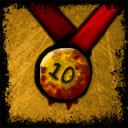Zainstaluj Steam
zaloguj się
|
język
简体中文 (chiński uproszczony)
繁體中文 (chiński tradycyjny)
日本語 (japoński)
한국어 (koreański)
ไทย (tajski)
български (bułgarski)
Čeština (czeski)
Dansk (duński)
Deutsch (niemiecki)
English (angielski)
Español – España (hiszpański)
Español – Latinoamérica (hiszpański latynoamerykański)
Ελληνικά (grecki)
Français (francuski)
Italiano (włoski)
Bahasa Indonesia (indonezyjski)
Magyar (węgierski)
Nederlands (niderlandzki)
Norsk (norweski)
Português (portugalski – Portugalia)
Português – Brasil (portugalski brazylijski)
Română (rumuński)
Русский (rosyjski)
Suomi (fiński)
Svenska (szwedzki)
Türkçe (turecki)
Tiếng Việt (wietnamski)
Українська (ukraiński)
Zgłoś problem z tłumaczeniem


 United States
United States 



























































א (Aleph): Represents a glottal stop, like the "a" in "father."
ב (Bet/Vet): Sounds like "b" (as in "bat") or "v" (as in "vat"), depending on context.
ג (Gimel): Similar to the "g" in "go."
ד (Dalet): Like the "d" in "dog."
ה (He): Sounds like "h" (as in "hat").
ו (Vav): Similar to "v" (as in "vat") or "w" (as in "wonder").
ז (Zayin): Like the "z" in "zebra."
ח (Het): A guttural sound, similar to the Scottish "loch" or the Spanish "j" in "jalapeño."
ט (Tet): Similar to the "t" in "top."
י (Yod): Like the "y" in "yes."
כ (Kaf): Sounds like "k" (as in "kite") or "ch" (as in "loch").
ל (Lamed): Similar to the "l" in "love."
מ (Mem): Like the "m" in "mother."
Feel free to practice these sounds and explore more about biblical Hebrew! 😊📜